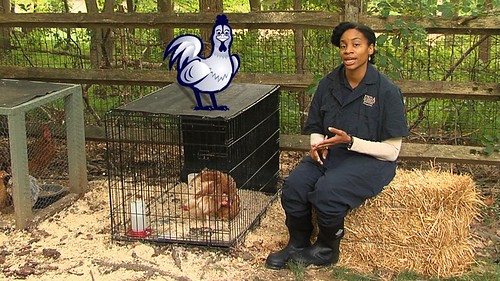By Dr. Chrislyn Wood Nicholson, Poultry Health Specialist
Since December 2014, there have been several highly pathogenic avian influenza (HPAI) confirmations in migratory wild birds, back yard flocks, captive wild birds and commercial poultry in several states along the Pacific, Mississippi and Central Flyways. These HPAI virus strains can travel in wild birds without them appearing sick. In fact, if back yard poultry flocks are exposed to these particular HPAI virus strains, they are highly contagious and cause bird death.

Dr. Wood on set with Healthy Harry taping new biosecurity videos.
We are expecting that there will be more HPAI confirmations this spring as the bird migrations continue, so if you own or handle poultry, now is a great time to check your biosecurity practices. You should follow good biosecurity at all times to help protect the birds’ health. Your actions can make a difference! Learn more here: http://healthybirds.aphis.usda.gov
As part of good biosecurity, you should prevent contact between your birds and wild birds, and report sick birds or unusual bird deaths to State/Federal officials, either through the state veterinarian or through USDA’s toll-free number: 1-866-536-7593. You also should avoid contact with sick/dead poultry or wildlife. If contact occurs, wash your hands with soap and water and change clothing before having any contact with healthy domestic poultry and birds. You are the best protection your birds have! Learn more here: http://healthybirds.aphis.usda.gov
What is biosecurity? Biosecurity means taking some simple steps to keep your birds away from germs AND germs away from your birds. If you follow good biosecurity, you will help ensure your birds remain healthy.
For backyard bird owners, there are 6 simple steps to biosecurity:
- Keep your distance – Isolate your birds from visitors and other birds.
- Keep it clean – Prevent germs from spreading by cleaning shoes, tools and equipment.
- Don’t haul disease home – Also clean vehicles and cages.
- Don’t borrow disease from your neighbor – Avoid sharing tools and equipment with neighbors.
- Know the warning signs of infectious bird diseases – Watch for early signs to prevent the spread of disease
- Report sick birds – Report unusual signs of disease or unexpected deaths.
Commercial producers should follow biosecurity recommendations from their industry associations and the National Poultry Improvement Plan.
Source:USDA